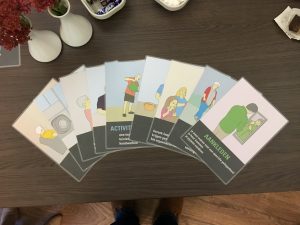
The idea to use a set of visual cards emerged from the discussion about the interviews and focus groups. The question arose how best to communicate with participants during the interviews, how to help them maintain their attention and to remember e.g. daily tasks and situations of daily living during the interviews. The aim of the cards was thus to provide support, both, for the interviewer and interviewee during the interview through being
- usable as a prompt and memory aid
- easy to understand because of offering a visual and written dimension
Cards to support interviews have already been used successfully by other researchers, e.g. Casais, Mugge & Desmet (2016). The MinD team reviewed existing cards as well as approaches of appropriate visualisation. This resulted in a decision to use illustration to visualise the activities in order to reduce them to the key characteristics and keep them visually simple and clear for easy recognition, following guidance for designing for elderly people (Marshall, 2016).
The cards were designed to cover three areas of activities and daily life in line with the mindfulness framework of the project,
and the focus of the interview schedules, covering:
- activities of daily living (ADL)
- social activities
- leisure activities
As part of the development process, different options for the cards have been presented to all members of the team as well as potential participants (through dementia outreach groups) to comment on. In this way, the cards have gradually become refined in terms of the chosen activities, figurative representations (concerning age, gender, ethnic diversity, etc.), visual readability, and other criteria.
So far the Visual Cards have been used, and their use observed, in eight interviews with people with dementia, to evaluate their role in supporting the interview process. They proved to be especially supportive as conversation starters in situations where participants did not directly know what to answer. Additionally, as a physical reminder, they helped the interviewers to cover all of the interview topics in the semi-structured interviews.
Visual Cards (German Version) – Download here
Visual Cards (Dutch Version) – Download here
Visual Cards (Spanish Version) – Download here
Visual Cards (English Version) – Download here
Please feel free to use the cards. If you do so, please give due acknowledgement to the authors, which are edited at the end of the cards. It would also be great to hear from you with some feedback via our contact page.
References:
Casais, M., Mugge, R. & Desmet, P. (2016). Using symbolic meaning as a means to design for happiness: The development of a card set for designers. Proceedings of DRS 2016, Design Research Society 50th Anniversary Conference. Brighton, UK, 27–30 June 2016.
Marshall, M. (2016). Dementia Friendly Design. Dementia Centre, HammondCare. Presentation at Nottingham University, UK.
